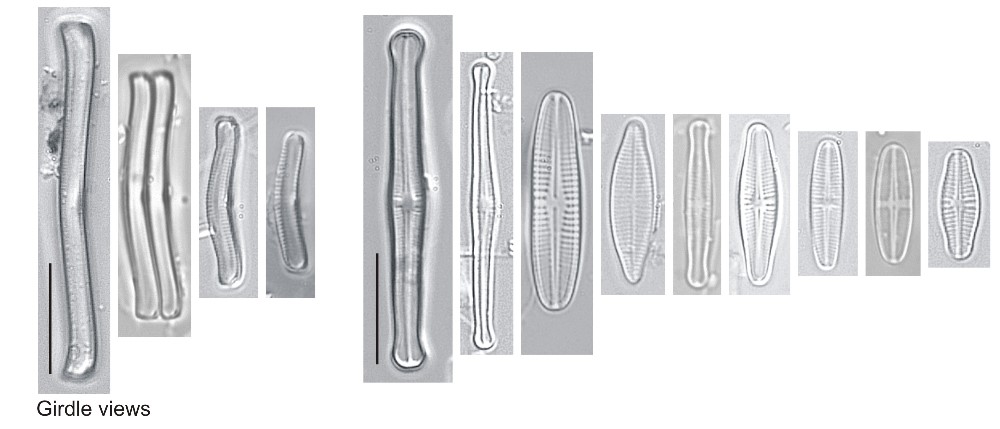Achnanthidium F.T. Kützing; 1844; 75
Key references
Novais M.H., Jüttner I., Van de Vijver B., Morais M.M., Hoffmann L., Ector L. 2015. Morphological variability within the Achnanthidium minutissimum species complex (Bacillariophyta): comparison between the type material of Achnanthes minutissima and related taxa, and new freshwater Achnanthidium species from Portugal. Phytotaxa. 224(2): 101-139.
Morphology
Frustules linear, lanceolate or elliptical in valve view, bent about the transapical axis to form a shallow 'v'; in girdle view, frustules arched, apices sometimes reflexed.
Frustules isopolar, heterovalvar with a concave raphe valve and a convex rapheless valve; valves bilaterally symmetrical.
Striae usually uniseriate, mostly radiate, sometimes parallel or convergent; areolae mostly circular, occluded by fine pore plates (hymenes); a row of elongated areolae on the mantle is separated by a hyaline area from the striae on the valve face.
Width of axial area variable, but often narrow, linear. Central area on raphe valve varies in size and shape from round to oval, it can form a transverse fascia or be absent.
One valve with a simple central raphe; central raphe endings straight, simple hardly expanded or slightly expanded; terminal fissures straight or deflected to the secondary side.
Cells attached to substrata by short mucilage stalks secreted from one end of raphe valve, cells can remain joined after division to form short chains. Cells with a single chloroplast lying against the araphid valve and one side of the girdle.
Frustules isopolar, heterovalvar with a concave raphe valve and a convex rapheless valve; valves bilaterally symmetrical.
Striae usually uniseriate, mostly radiate, sometimes parallel or convergent; areolae mostly circular, occluded by fine pore plates (hymenes); a row of elongated areolae on the mantle is separated by a hyaline area from the striae on the valve face.
Width of axial area variable, but often narrow, linear. Central area on raphe valve varies in size and shape from round to oval, it can form a transverse fascia or be absent.
One valve with a simple central raphe; central raphe endings straight, simple hardly expanded or slightly expanded; terminal fissures straight or deflected to the secondary side.
Cells attached to substrata by short mucilage stalks secreted from one end of raphe valve, cells can remain joined after division to form short chains. Cells with a single chloroplast lying against the araphid valve and one side of the girdle.
Literature
References are given in chronological order.
Reference |
Citation |
|---|---|
| Kützing F.T. 1844. Die Kieselschaligen Bacillarien oder Diatomeen. Fr. Fritsch, Nordhausen. 152 pp; 30 pls | Morphology; Description; Taxonomy |
| Lange-Bertalot H., Krammer K. 1989. Achnanthes eine Monographie der Gattung mit Definition der Gattung Cocconeis und Nachträgen zu den Naviculaceae. Bibliotheca Diatomologica Vol. 18. 393 pp; 100 pls | Morphology; Taxonomy; Illustrations |
| Round F.E., Bukhtiyarova L. 1996. Four new genera based on Achnanthes (Achnanthidium) together with a re-definition of Achnanthidium. Diatom Research. 11(2): 345-361. | Morphology; Description; Illustrations; Taxonomy |
| Novais M.H., Jüttner I., Van de Vijver B., Morais M.M., Hoffmann L., Ector L. 2015. Morphological variability within the Achnanthidium minutissimum species complex (Bacillariophyta): comparison between the type material of Achnanthes minutissima and related taxa, and new freshwater Achnanthidium species from Portugal. Phytotaxa. 224(2): 101-139. | Morphology; Type Illustration; Taxonomy |
| Karthick B., Taylor J.C., Hamilton P.B. 2017. Two new species of Achnanthidium Kützing (Bacillariophyceae) from Kolli Hills, Easterns Ghats, India. Fottea, Olomouc. 17(1): 65-77. | Morphology; Taxonomy; Illustrations |
This page should be cited as:
Jüttner I. Achnanthidium F.T. Kützing; 1844; 75. In: Jüttner I., Carter C., Cox E.J., Ector L., Jones V., Kelly M.G., Kennedy B., Mann D.G., Turner J. A., Van de Vijver B., Wetzel C.E., Williams D.M..
Freshwater Diatom Flora of Britain and Ireland. Amgueddfa Cymru - National Museum Wales. Available online at https://naturalhistory.museumwales.ac.uk/diatoms/browsespecies.php?-recid=3661. [Accessed:
].
Record last modified: 27/12/2020


